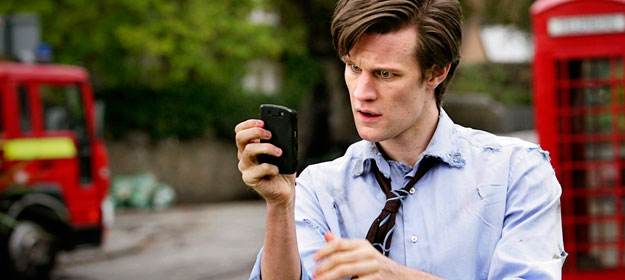 (Just as a note, TVOvermind’s regular Doctor Who-capper, Paul Kerton, has posted his review which you can read here. However, we both decided that a review from an American perspective would also be interesting. In the future, we’ll be merging the recaps for a look at the series from both perspectives.)
(Just as a note, TVOvermind’s regular Doctor Who-capper, Paul Kerton, has posted his review which you can read here. However, we both decided that a review from an American perspective would also be interesting. In the future, we’ll be merging the recaps for a look at the series from both perspectives.)
It’s not often you get to see a show completely reinvent itself. Sure, NBC’s Scrubs sort of did that last year, and BBC’s Skins did an even bigger reinvention two years ago. But as far as reinvention goes, you probably haven’t seen one as big or as sudden as the one Doctor Who just went through.
Let’s start off with a bit of history. Doctor Who was a long-running television show that started back in the 1960s. It told the story of a Time Lord (basically a genius time-traveler) named the Doctor who travelled through the universe in a spaceship called the TARDIS, which resembled a blue police box. The show planned its longevity very creatively — even though the Doctor remained one character, he would be able to regenerate when near death, thus saving his life — and gaining a new face and personality in the process. This ensured that the show was not reliant on any cast member, and could simply write in a regeneration when it became necessary to change out the lead actors.
The series, however, soon succumbed to low budgets and bad storylines in 1989. A television film done by FOX happened in 1996 (the only American production of the franchise thus far), with Paul McGann appearing in the Doctor’s eighth incarnation. And for nine years after that, the series remained dormant until a television writer named Russell T. Davies took it upon himself to restart the franchise.
Christopher Eccleston (who American audiences will know as Claude Rains from Heroes and McCullen/Destro from G.I. Joe: The Rise of Cobra) portrayed the Doctor’s ninth incarnation, and helped to turn the revitalized series into a huge success. After just one season, however, Eccleston decided to leave the series, and was replaced by perhaps the most well-known and -liked Doctor yet: David Tennant. Tennant’s frenzied and fast-talking Tenth Doctor quickly caught on with viewers, and he stuck around with the show for four more seasons and a handful of specials.
However, Tennant’s run too came to an end, with his final appearance being in “The End of Time, Part 2,” which aired on January 1, 2010 (the episode also marked the end for Davies as a showrunner, with Steven Moffat replacing him). After being exposed to huge amounts of radiation, the Doctor violently regenerated inside his TARDIS, severely damaging his ship and transforming into the Eleventh Doctor, played by Matt Smith. When we last saw the Doctor, he was hurtling back to Earth in his damaged craft, joyfully screaming “Geronimo,” his apparent new catchphrase.
The beginning of the fifth series of the show continued literally only moments later, with the Doctor hanging on for dear life as the TARDIS plummets toward the ground. And he crash-lands in the backyard of a little girl, Amelia Pond, who lives with her aunt. However, her aunt is out when the Doctor arrives, so Amelia goes out to investigate alone. And who does she meet but a scraggly Doctor, who climbs out of the wreckage of his TARDIS sopping wet — he’d fallen into the swimming pool in one of the TARDIS’s many rooms.
Amelia is fascinated by the Doctor, though he’s also fascinated with himself — or rather, by his new form. In a rather humorous montage, he gets Amelia to fix him various foods which he has sudden cravings for, and then he spits them all out when he discovers he no longer likes them. Eventually, he finds out about a crack in Amelia’s wall that has been bothering her. It’s not a crack in just the wall, he determines; it’s a crack in the universe itself. And through it, a prisoner has escaped from a galactic prison. He’s called “Prisoner Zero,” and with a name like that, you know he’s not in there for a misdemeanor.
Anyway, the Doctor takes off in the TARDIS briefly in an attempt to repair it, but instead travels twelve years into the future, where he meets a grown-up Amelia — now known as Amy — who isn’t too pleased with him leaving her behind all those years ago. In fact, she’s kind of obsessed with him over all those years, and his return has thrown her for a loop — but also vindicated her to those who thought she was simply having a resilient imaginary friend.
Anyway, I won’t spoil the episode for you American viewers, but I have to say that it’s definitely my favorite. It maintains somewhat the same aesthetic of the previous series, but it feels very different. As lovable as Tennant’s Doctor was, he’s very nearly forgotten in the face of Matt Smith, who is already the Doctor in my mind. Smith takes the role and makes it his own, with a much fiercer personality than either Tennant or Eccleston’s Doctors. And Karen Gillan, as new assistant Amy Pond, is both feisty and memorable, and there is definite chemistry between her and Smith. I like them both, and look forward to seeing more of them in the future.
Speaking of new additions, the TARDIS rebuilds itself and is absolutely dazzling, though you only get to see it in the final scene of the episode. There’s also a new (green!) sonic screwdriver, and more importantly, a new title sequence that’s even more intense than the previous one we’re used to, with a new font, electric storms, and interesting new theme music that still very similar to the old theme, with darker undertones and a slightly lower key (and it’s brassier).
Overall, the episode was everything I wanted it to be, and it marks a fresh new start for a series that has made its name on fresh new starts. A+
 Follow Us
Follow Us





